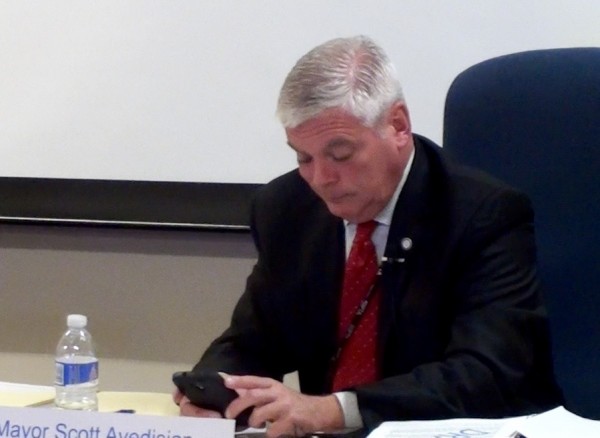
RIPTA is considering raising bus fares by $1 on disabled, elderly and the homeless, and more than two dozen advocates and representatives from those communities voiced their opposition at the RIPTA board meeting held in the middle of the afternoon yesterday.
They wondered why RIPTA (Rhode Island Public Transportation Authority) is considering balancing its budget on the poorest and most vulnerable communities. For some, the bus is their only means of travel. Raising the rates will mean getting out of the home and into the community less.
As William Flynn, executive director of the Senior Agenda Coalition of RI said, “Isolation kills, and transportation is a vital part of fighting isolation.” He thinks as many as 4,500 Rhode Islanders may be affected by the plan.
Another speaker, from the RIPTA Riders Alliance, cited a Brown University study that showed that on average, people on fixed income may have as little as $40 a month of discretionary cash. Raising the bus fares on these people is estimated to cost an average of $30 a month. Several present and former clergy, such as the Reverend Chris Foster of the Providence Presbyterian Church, implied that the very consideration of a plan that goes after the last dollars of the poor and vulnerable was “immoral” and implored the board to find other ways of closing the funding gap.
Amazingly, the RIPTA board almost didn’t have a quorum when the meeting started, many of the board members did not even show up at what one observer called the most packed public commentary meeting in years. Warwick Mayor Scott Avedisian, chairman of RIPTA’s Board of Directors, was often seen reading his cellphone during testimony, apparently unable to feign interest for the concerns of the poor, disabled, homeless or elderly.
Ray Studley, RIPTA CEO, like most other board members presents, was attentive, but after public commentary ended, he made false and misinformed comments about the availability of Medicare billable transportation services through Logisticare. Logisticare is a private company used by the state to transport people to non-emergency doctor appointments. The company requires scheduling trips up to weeks in advance, and according to many who spoke to me outside the meeting, is unreliable, often late or doesn’t show up at all.
Further, Logisticare does not provide rides for anything but Medicare billable transportation. Shopping, work, visits to family, social engagements, pharmacy visits and even necessary trips to rehabilitation support groups like Alcoholics Anonymous, are not covered, despite what Studley was saying. Of course, Studley said this after public comment was over, so those I talked to outside RIPTA after the meeting were frustrated that they had no chance to refute this.
Logisticare is expensive. The state is billed, through Medicare, much more than it costs to provide free bus trips for some groups of people. If a senior is able to use the bus for a regular doctor’s appointment, why force that person to use a more expensive and more specialized means of transportation at a much higher cost to the state?
William Flynn of the Senior Agenda Coalition knows a woman in recovery who goes to four or five AA meetings a week. These meetings are her lifeline. If she misses meetings, her odds of relapsing go up. Others may start missing needed doctors appointments or not fill prescriptions in a timely manner. The economic cost to our state in terms of emergency medical services will rise, but more importantly there will be a rise in misery and suffering.
Balancing budgets on the backs of the poor is never the right thing to do.
Below is the testimony of all 17 people who spoke out at the board meeting.
“I can not impress upon you the damaging effect… many of these people are living on incomes of less than $800 a month…”
“…the dollar will cost them $360 a year, we’re talking about people who make $782 a month…”
“…to a lot of the people here… that’s not a lot of money at all..” but to those on a fixed income…
…not only the cost, but the isolation they face in Providence with the difficulty of getting around…”
“…there will be an increase of physical and mental afflictions as well as an increase in visits to the emergency room…”
“Those with mental illness tend to isolate, and if they don’t have a lot of support they isolate and don’t take care of themselves…”
“If this proposal goes through… I won’t be able to go to Rhode Island College…”
“The Pope [was] talking about the small things that we do that result in justice, mercy and the care of others. This is what he’s talking about…”
“There’s people downtown stranded right now and there’s homeless people downtown every day in Kennedy Plaza. They cannot get on the bus if they don’t look right…”
“The greatest single factor that leads to shorter lives for people is isolation.”
“We are all responsible for all, and to all. This is a basic framework, a basic belief of all our major religions. The Judeo-Christian, the Muslem, the Hindu, Buddhist, even the non-religious, the Humanists!”
“Each time we take the bus we have to take several buses a day to attend programs that greatly improve the quality of of our illnesses or disablities…”
“In my last twenty years I’ve seen seniors who are of low income come to me because they have no food. I’ve seen them come to my center because they have no money. I’ve seen them come to my center because they’re in the dark because they can’t pay their electric bill…”
“I know people who have cars and high paying jobs who are ethically outraged by this…”
“Brown University did a study and the average discretionary monies per month for disabled and elderly people is around $40…”
And here’s RI Future’s own Andrew Stewart!
]]>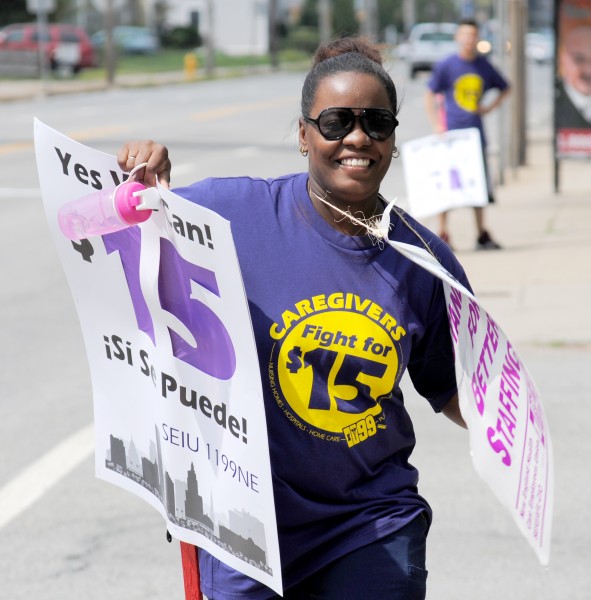 Over 150 front line medical caregivers rallied on Newport Avenue in Pawtucket yesterday afternoon to demand a minimum wage of $15. The timing and location of the event was carefully considered.
Over 150 front line medical caregivers rallied on Newport Avenue in Pawtucket yesterday afternoon to demand a minimum wage of $15. The timing and location of the event was carefully considered.
It was the 50th anniversary of Medicare and Medicaid. The location, near Slater Park, is around the corner from two healthcare providers, ARC of Blackstone Valley, which provides services to adults with developmental disabilities and the Pawtucket Center, a Genesis Heath Care skilled nursing facility.
The rally was also just two miles from the Massachusetts border, where home care workers recently won a minimum wage of $15 to be phased in over the next few years. Rhode Island does not pay nearly as much.
SEIU 1199, representing the healthcare workers, released figures showing that at Pawtucket Skilled Nursing & Rehab, the starting rate is $11.75. 63 percent of workers make less than $15. At ARC of Blackstone Valley many direct care staffers earn $10.75 and 94 percent earn less than $15. Meanwhile, two miles up the street, a caregiver could find a job paying $15.
I spoke with two women whose adult, disabled children are cared for at ARC of Blackstone Valley. Both attested to the excellent care their families receive and to the need for paying better wages. The caregivers at ARC are like family, said Pat, whose daughter Rachel has many special care requirements.
Two women who work as personal care attendants in Massachusetts also addressed the rally. Deborah Hahn said, “…if Massachusetts PCAs can win $15, if New York fast food workers can win $15, you can too.”
This event is seen as part of the “expanding #fightfor15 movement” which has been defying expectations and scoring significant wins in recent weeks. The healthcare workers were joined at the rally by a host of labor and community groups, including the AFL-CIO, Unite Here! 217, Jobs with Justice, Fuerza Laboral, NEARI, Teamsters 251, UNAP, UFCW 328, and the RI Progressive Democrats. State Representatives David Bennett, Mary Duffy Messier and Scott Slater were also on hand.
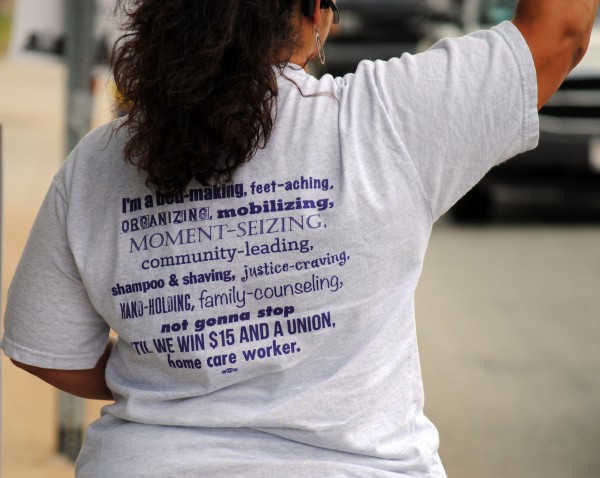

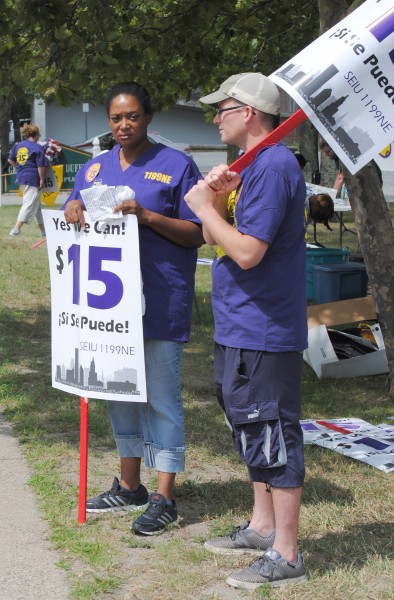
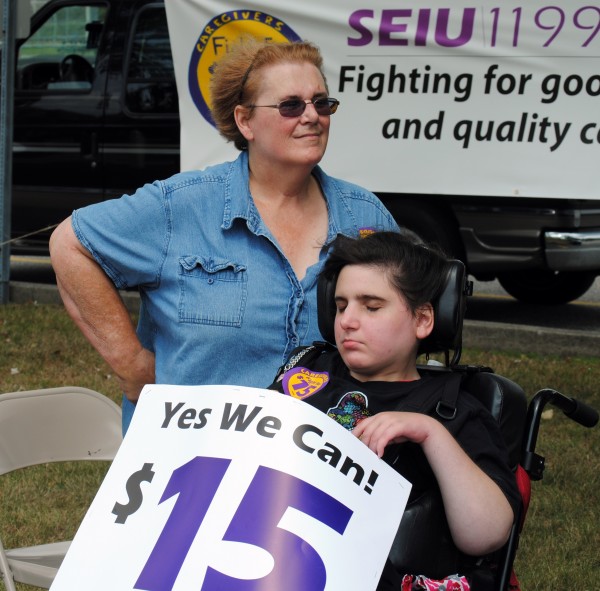
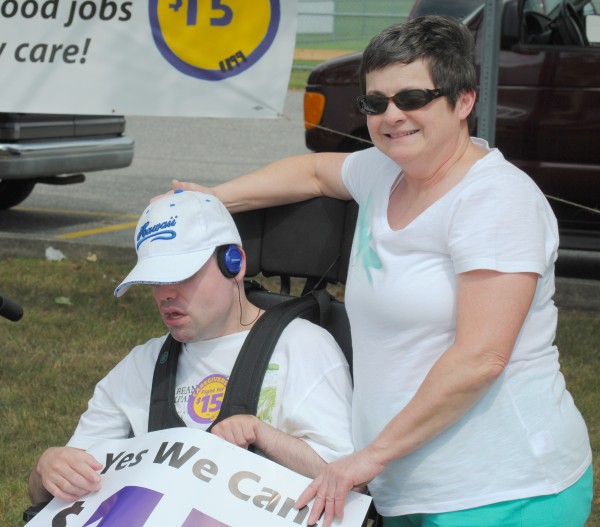
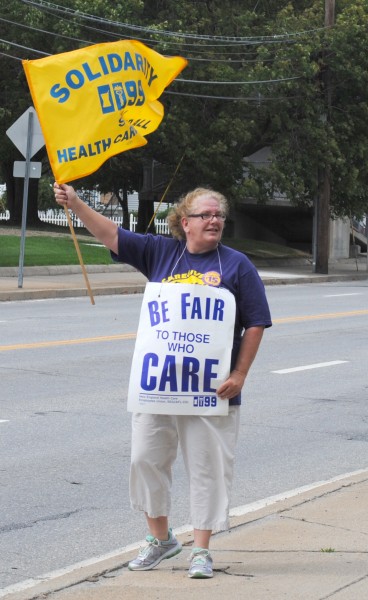

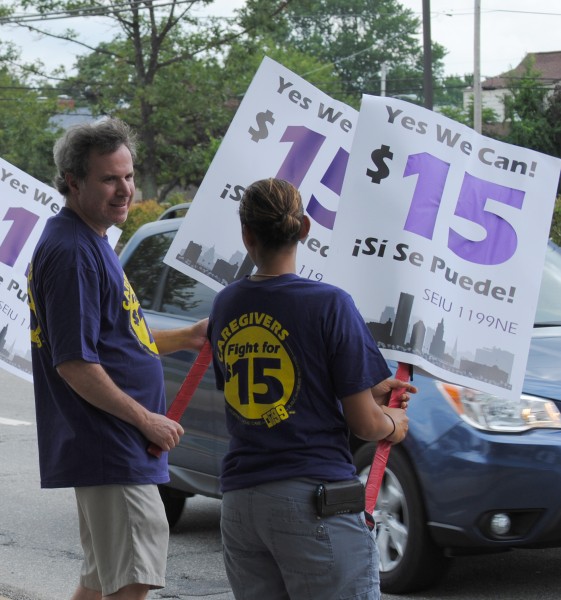
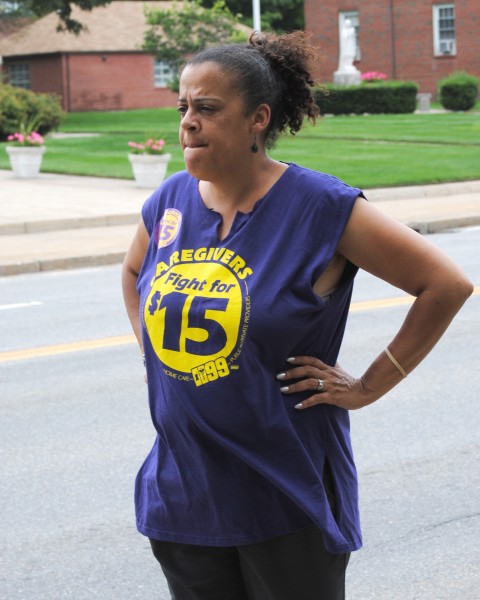


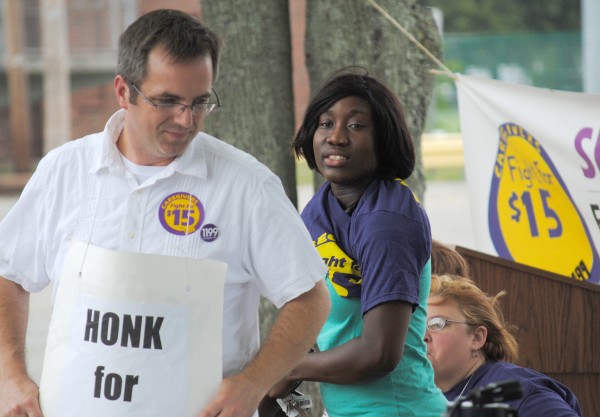
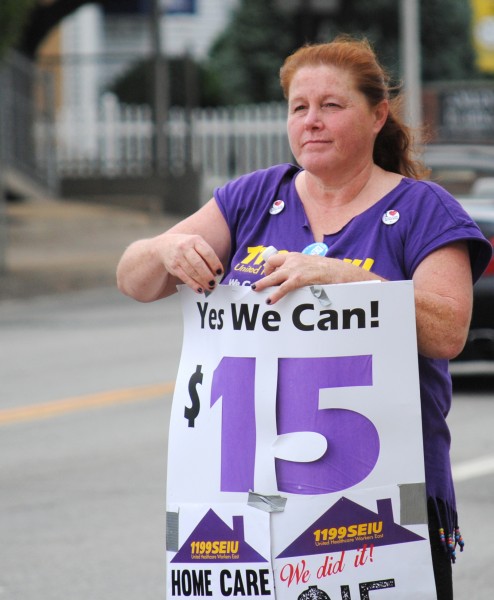
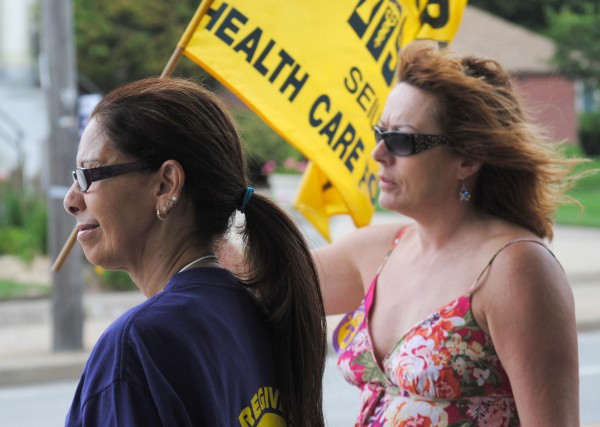


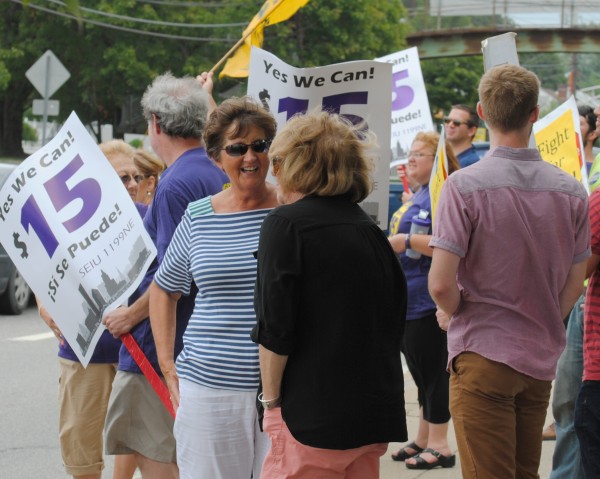
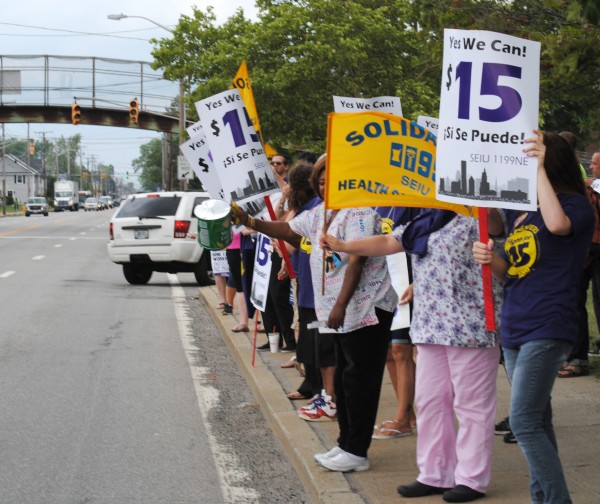




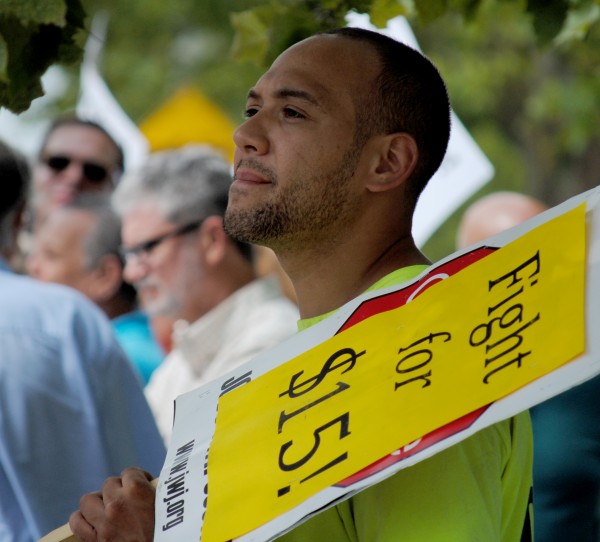

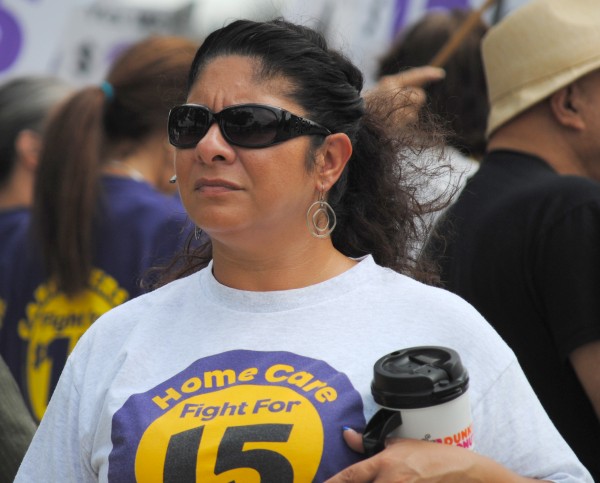




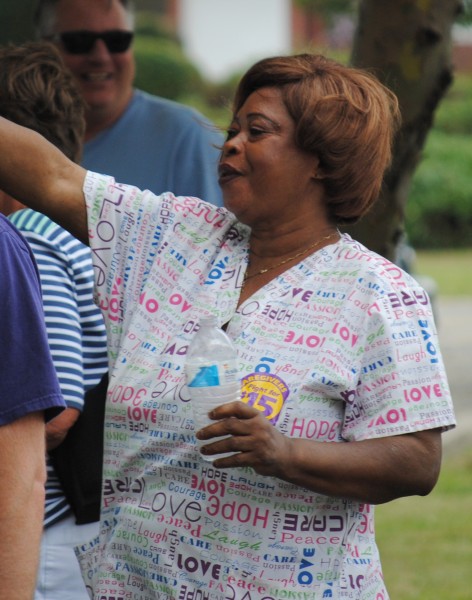




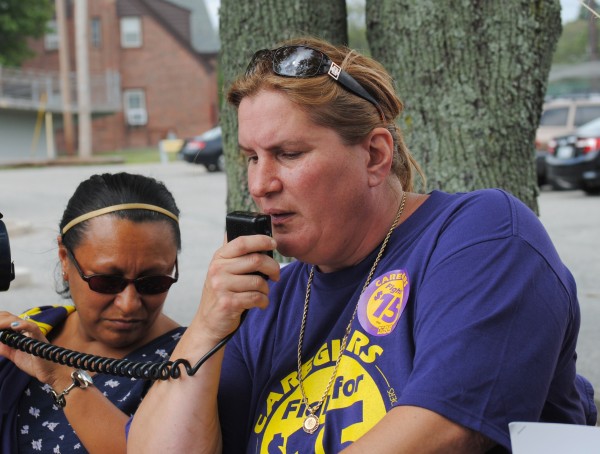
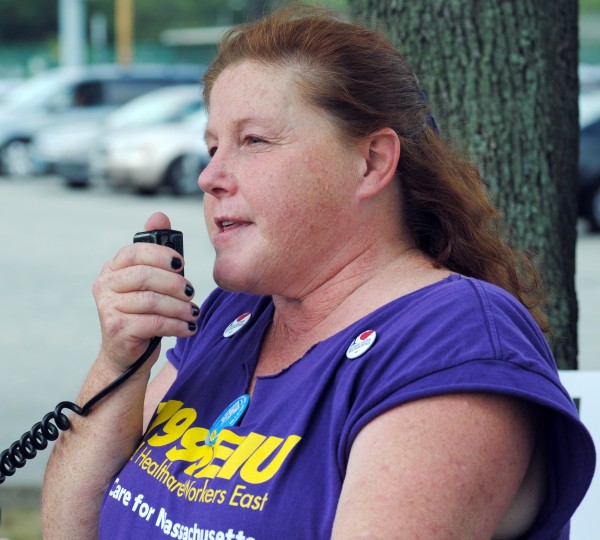

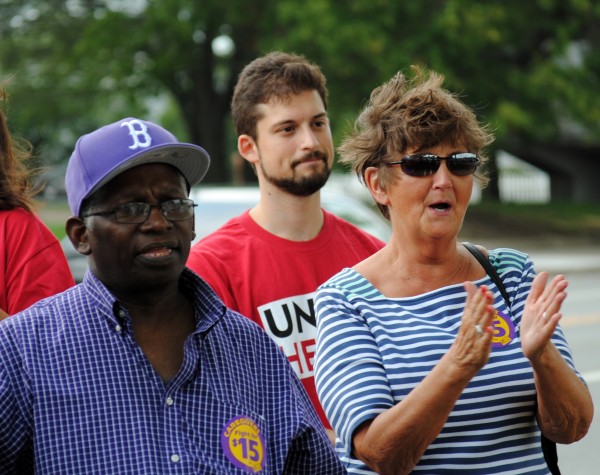

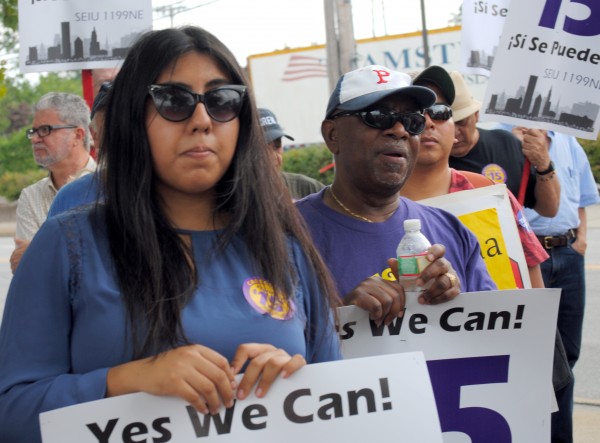

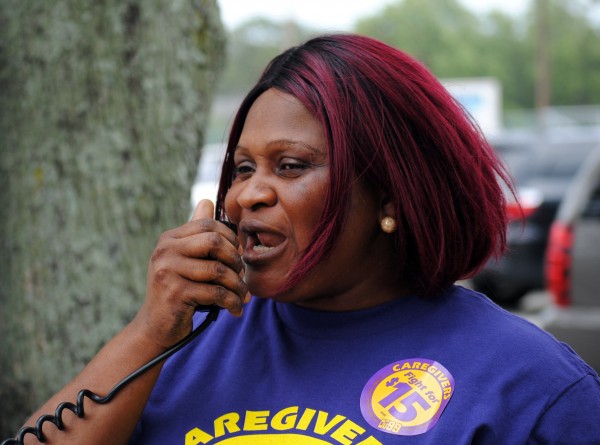
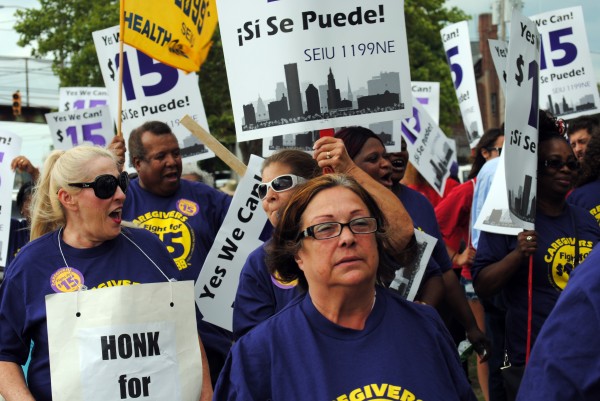



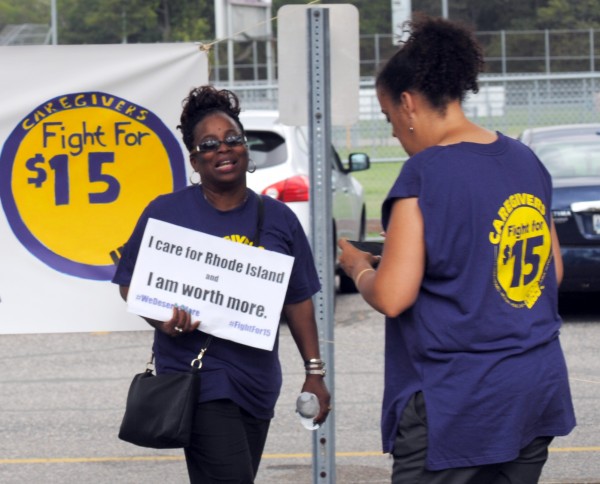
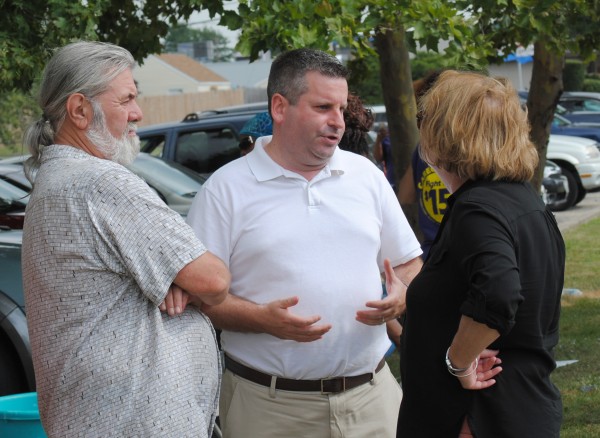

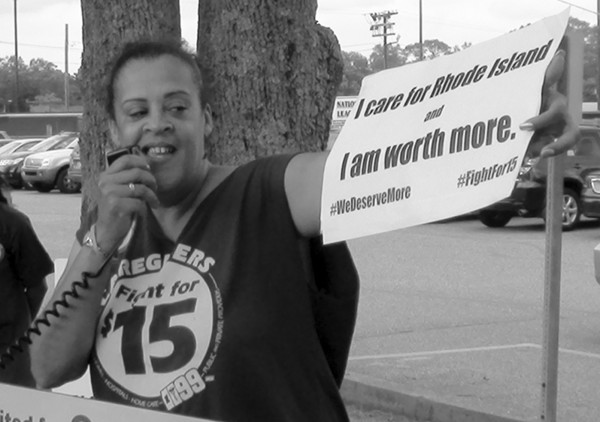


 Congress put aside its fierce partisan bickering and came together to pass H.R. 2 –the Medicare Access and CHIP Reauthorization Act of 2015 (MACRA). This week President Obama took the opportunity to sign the legislation package into law.
Congress put aside its fierce partisan bickering and came together to pass H.R. 2 –the Medicare Access and CHIP Reauthorization Act of 2015 (MACRA). This week President Obama took the opportunity to sign the legislation package into law.
The congressional fix repeals and replaces the flawed Medicare physician reimbursement system known as the sustainable growth rate (SGR). For the past 13 years, physicians have faced the possibility of an arbitrary cut in their Medicare payments unless congressional lawmakers passed a so-called “Doc Fix” Medicare bill. Since 2003, Congress has passed 17 short-term bills to block these cuts in Medicare doctors’ fees that were called for under the existing law.
On April 14, the Senate passed the MACRA by a whopping 92 to 8 (the House passing its version of the bill in late March by a large margin, 392-37). Two days later, at an outdoor signing ceremony in the Rose Garden, President Obama signed the legislation into law, with the House bill brokers, Speaker John Boehner (R-Ohio) and House Minority Leader Nancy Pelosi (D-Calif.) in attendance. .
A Permanent Fix Prevents Payment Cuts
Just hours before a cut in reimbursement that would take place this week, a rare bipartisan congressional effort prevented a 21 percent cut in Medicare payments to occur. It’s a permanent fix. And the new law extends the Children’s Health Insurance Program, which has provided coverage to millions of American children.
At the signing, Obama called the passage “a milestone for physicians, and for the seniors and people with disabilities who rely on Medicare for their health care needs,” noting that it would also strengthen the nation’s health care delivery system for the long run.
Obama stated this new law “creates incentives to encourage physicians to participate in new, innovative payment models that could further reduce the growth in Medicare spending while preserving access to care.”
According to the Center for Medicare Advocacy (CMA), a national nonprofit, nonpartisan law group that provides education, advocacy and legal assistance to older people and people with disabilities, the estimated cost of the new law is roughly $214 billion over 10 years. CMA says roughly half (approximately $35 of the total $70 billion over 10 years) will come from Medicare beneficiaries through changes that will increase their out-of-pocket costs for health care.(through means testing of higher-income Medicare beneficiaries, increased Part B premiums, and added deductibles to Medigap plans purchased in the future.”
CMA adds that the nation’s pharmaceutical and insurance industries were not required to pay for any of this law, although doing so would have paid for a major portion of the SGR replacement.
Crossing the Aisle
“The Sustainable Growth Rate formula threatened the stability of the Medicare program, and I’m glad we were able to pass a long-term solution to address it. I believe it was a reasonable compromise that will provide financial certainty to health care providers while protecting benefits for low and middle-income seniors,” said Senator Sheldon Whitehouse. The Democratic senator, a member of the Senate Special Committee on Aging, notes that the new law will “boost efforts to pay providers based on quality and outcomes of care, an area where Rhode Island has been a leader.”
Rep. David N. Cicilline gave his take on the new law. “Fixing the Sustainable Growth Rate formula will help ensure that more than 180,000 Rhode Islanders who receive Medicare benefits can keep their doctor and continue to receive quality, affordable health care when they need it, the Democratic Congressman said, noting that “We need to see more bipartisan solutions in Congress like this one.”
Finally, Rep. Jim Langevin, adds, “Although this compromise wasn’t perfect, I am pleased that Congress could come together in a true display of bipartisanship to reach an agreement that increases access to quality heath care for our most vulnerable seniors, provides stability and predictability for physicians and extends the crucial Children’s Health Insurance Program.”
On the Backs of Medicare Beneficiaries
Aging advocacy groups, including the Center for Medicare Advocacy and AARP, failed in their attempts to improve the Senate bill Medicare beneficiaries, including a repeal of the annual therapy caps, raising eligibility standards for low-income programs and permanently extending outreach and education funding for critical programs aimed at low-income beneficiaries. The Senate bill passed without amendments.
While many gave thumbs up to the new law, Max Richtman, president and CEO of the Washington, DC-based National Committee to Preserve Medicare and Medicaid, sees big problems with MACRA.
“The Senate ‘Doc Fix’ vote has traded one bad policy for another, shifting the costs of Congress’ failed Medicare payment formula for physicians to seniors who can least afford to foot that bill. Contrary to claims by supporters, on both sides of the aisle, this ‘doc fix’ will hit millions of seniors who aren’t ‘wealthy’ by any stretch of the imagination. Seniors at all income levels who are already paying steep premiums for Medigap plans to help control their health care costs will now be hit with even higher costs. 46 percent of all Medigap policy holders have incomes of $30,000 or less, he said.
“Medicare beneficiaries will also be forced to contribute nearly $60 billion in premiums over the next decade thanks to passage of this so-called ‘fix,’” Richtman added. “It’s no surprise that conservatives applaud this legislation as ‘the first real entitlement reform in two decades’ because it fulfills their political goal of shifting costs to seniors, cutting benefits and expanding means-testing to push Medicare further and further away from being the earned benefit seniors have long valued and depended on. Trading a bad deal for doctors for a bad deal for seniors is not a legislative victory and it is a surprising move from so many in Congress who have previously vowed to protect Medicare from harmful benefit cuts and seniors from cost-shifting.”
AARP CEO Jo Ann Jenkins also expressed strong disappointment in the Senate not passing an amendment that would have removed Medicare’s arbitrary cap on physical therapy, speech language pathology, and occupational services. “Many Medicare patients, particularly stroke victims and people with Parkinson’s and Multiple Sclerosis would have benefited,” says Jenkins. With a majority of the Senate agreeing with this amendment, Jenkins says that AARP will continue to lobby to remove the arbitrary coverage cap.
But, Jenkins sees the positives. “Passage of MACRA moves Medicare in the right direction toward better quality health care and greater transparency for patients. These changes will benefit Medicare beneficiaries, as well as physicians and other providers, hospitals, and the overall health care system,” she says.
.
Through the enactment of MACRA Congress put aside its political differences that made a permanent fix to a flawed law. If you can do it once, let’s see our lawmaker do this again, to provide improved programs and services to our nation’s older population.
 President Obama released his 141 page ‘policy and wish list” when he unveiled his politically ambitious FY 2016 budget on Feb 2, not having to worry about running for president in the upcoming 2016 presidential election cycle.
President Obama released his 141 page ‘policy and wish list” when he unveiled his politically ambitious FY 2016 budget on Feb 2, not having to worry about running for president in the upcoming 2016 presidential election cycle.
Yes, even inside the Washington Beltway a picture is truly worth a thousand words. Gone is the budget’s plain blue cover replaced by a black and white photo of the Tappan Zee Bridge in New York, an image that projects one of the President’s spending priorities of rebuilding the nation’s infrastructure to create jobs and improve the transportation system.
The $4 trillion presidential budget, a political campaign document outlaying his policies and priorities, would cancel automatic sequestration cuts to domestic and military programs over a 10 year period. According to the New York Times, Obama’s budget proposal would add $6 trillion to the national debt, and the single-year deficit would rise to $687 billion by 2025.
Obama’s FY 2016 budget puts more funding into education, rebuilding the nation’s infrastructure, increased defense spending, along with providing tax relief for America’s middle class while increasing the taxes for corporate America and the wealthy. Political insiders say that Obama’s budget, one that gives to the middle class and assesses higher taxes from corporate America and the wealthy, sets the issues to be surely debated in the upcoming presidential election. .
A Look at Aging Priorities
In a Feb. 3 blog post, Nora Super, executive director of the upcoming White House Conference on Aging, details how the recently released budget proposal will “ensure that older Americans enjoy not only longer but healthier lives.”
As to retirement security, Super notes that the Obama Administration strongly opposes any legislative measures that would privatize the nation’s Social Security program, or slash benefits for future generations or reduce basic benefits to current beneficiaries. Super says that half the nation’s workforce, that’s about 78 million, does not have a retirement savings plan at work. “Fewer than 10 percent of those without plans at work contribute to a plan of their own. The President’s FY 2016 Budget expands retirement opportunities for all Americans to help families save and give them better choices to reach a secure retirement,” she says.
According to Super, Obama’s Budget proposal supports healthy aging by strengthening the Medicare program by “aligning payments with the costs of providing care, along with encouraging health care providers to deliver better care and better outcomes for their patients, and improving access to care for beneficiaries.”
To put the brakes to rising prescription drug costs, Super notes that the President’s Budget proposes to close the Medicare Part D donut hole for brand drugs by 2017, rather than 2020, by increasing discounts from the pharmaceutical industry. The Budget proposal also gives the Secretary of Health and Human Services new authority to negotiate with drug manufacturers on prices for high cost drugs and biologics covered under the Part D program.
Linking nutrition to healthy aging, Super says that Obama’s Budget provides “over $874 million for Nutrition Services programs, a $60 million increase over the 2015 enacted level, allowing States to provide 208 million meals to over 2 million older Americans nation-wide, helping to halt the decline in service levels for the first time since 2010.” Also, Obama’s budget ratchets up funding for supportive housing for very low-income elderly households, including frail elderly, to give these individuals access to human services, she adds. .
Protecting older persons from elder abuse, neglect and financial exploitation, Super blogs that the President’s budget proposal includes $25 million in discretionary resources for Elder Justice Act programs authorized under the Affordable Care Act. “Funding will “improve detection and reporting of elder abuse; grants to States to pilot a new reporting system; and funding to support a coordinated Federal research portfolio to better understand and prevent the abuse and exploitation of vulnerable adults,” she says.
Here’s Super’s take on the Obama budgetary blueprint: “Taken together, these and other initiatives in the Budget will help to change the aging landscape in America to reflect new realities and new opportunities for older Americans, and they will support the dignity, independence, and quality of life of older Americans at a time when we’re seeing a huge surge in the number of older adults.”
In a released statement, AARP Executive Vice President Nancy LeaMond gives thumbs to the president’s efforts to “lower the cost of prescription drugs, promote better care, reward improved outcomes and make health care programs more efficient and less wasteful.” She also expresses her nonprofit group’s support for the President’s budgetary priorities to “create opportunities for the middle class” and his goal “to make saving for retirement easier.”
But, LeaMond expresses concerns that higher premiums, deductibles and copays might shift costs to older Americans. “As the federal deficit continues shrinking, we must find responsible solutions for strengthening critical programs and improving the retirement and overall economic security of current and future generations. We must also look for savings throughout the entire health care system, as the rising cost of health care threatens people of all ages,” she says.
In his statement, President/CEO Max Richtman, of the Washington, DC-based National Committee to Preserve Social Security and Medicare, agrees with LeaMond’s concerns of higher premiums, deductible’s and co pays, too. “While some tout increasing means testing in Medicare as a way to insure ‘rich’ seniors pay their share, the truth is, the middle-class will take this hit as well,” he predicts.
Political pundits say that Obama’s 2016 budget was dead-on arrival at Capitol Hill the day it was released at the beginning of February. In the shadow of the upcoming 50th Anniversary of Medicare, Medicaid, and the Older Americans Act, as well as the 80th Anniversary of Social Security, GOP leadership in both chambers of Congress must work with the Democratic President to hammer out a bipartisan compromise. Putting budgetary proposals that strengthens the nation’s programs and services for older Americans on the chopping block for purely political reasons is not acceptable, especially to a nation that opposes political gridlock.
Herb Weiss, LRI ’12, is a Pawtucket-based writer covering aging, health care and medical issues. He can be reached at hweissri@aol.com.
]]>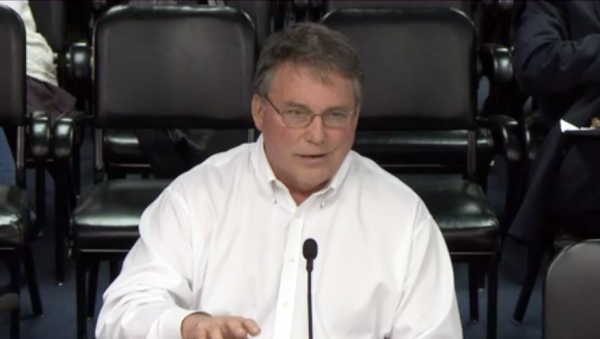
Rep David Bennett’s bill to increase the Rhode Island minimum wage to $10.10 from its current $9 would be the fourth time in four years that the lowest earning Rhode Islanders would see an increase in their pay due to legislative action. Like always, such an increase will not come without a fight.
Last week’s meeting of the House Labor Committee saw five different business lobbying groups send representatives to speak against any increase. During the two hours of testimony, any reason that could be dredged up to oppose increasing the minimum wage was presented – including fear mongering, the citing of questionable studies and downright falsehoods.
Lenette Boisselle, representing the Rhode Island Hospitality Association, suggested that the minimum wage is merely a temporary training wage, and not much used in the state, even though Rep. Bennett just testified that there are 45,000 Rhode Islanders making minimum wage. Boisselle said that we don’t yet know what effects the recently enacted minimum wage increase will have on our state’s economy. Elizabeth Suever, of the Greater Providence Chamber of Commerce, agreed with Boisselle and suggested that the state do a study to determine what the appropriate minimum wage should be.
Bob Bacon, who is the chairman of the RI Hospitality Association and runs Gregg’s Restaurants, a small chain of medium priced eateries, maintained that any increase in the minimum wage will force prices to rise, resulting in no advantage for workers. But what minimum wage advocates should really be worried about, according to Bacon, are robots.
“There’s already massive movement towards technology that will eliminate the need for labor,” said Bacon, “In many restaurants now you have touch pads. Guess what’s next? Pretty soon you’re placing your order on that thing and it’s going to take ten less people to serve you your dinner. And McDonald’s has a system now that one guy at the end of the line starts the burger process and it spits out the other end and they eliminated three people in the middle.”
John Simmons, of the Rhode Island Public Expenditure Council, did Bacon one better. “There’s been some work done, I think, by McDonald’s, as a matter of fact. In particular, on hamburger making. There is some expertise now that they’re drafting up that there will be no person making hamburgers anymore at McDonald’s. It will be all done by machine.”
That workers demanding fair pay will force industry to develop robots has been the refrain from economic conservatives for a while now. The Wall St. Journal ran a piece called “Minimum Wage Backfire” that blamed business automation on minimum wage activists, writing, “The result of their agitation will be more jobs for machines and fewer for the least skilled workers.” Conservative blogs and other media have run with the story, but there’s no truth in it.
As Patrick Thibodeau points out in Computerworld, “The elimination of jobs because of automation will happen anyway.” Some experts think that robots and computers will “replace one third of all workers by 2025.”
Bob Bacon must know this.
Gregg’s Restaurants is a pioneer in the computerization of restaurants. Most of the millions made by Bill and Ted Fuller, owners of the small chain, has come from POSitouch, “the food service industry’s most feature rich POS system.” I’ve heard rumors that the entire Gregg’s Restaurant chain is a loss leader, maintained to demonstrate the POSitouch system to interested buyers.
If robots were able to do the work needed to replace people in restaurants, POSitouch would be in a position to know. The information Bacon and Simmons presented about the hamburger machine is probably untrue, because if the technology existed to automate the burger making process, McDonald’s would already be using it. Instead, McDonald’s is investing in ordering kiosks, like ATMs in banks or the self-checkout machines at supermarkets. And it’s doubtful that these kiosks could be prevented if the employees agreed to work for less money.
How can any worker live on less than it takes to maintain an iPad?
John Simmons made the additional point that an increase in the minimum wage is basically unnecessary because, if you are on minimum wage then “you are probably getting earned income tax credits, you’re getting Medicare, you’re getting all the social programs which are allowing you to offset all the inflationary issues because you’re not paying for them anymore.”
That’s true. Low wage workers are not paying for all this government assistance. Taxpayers are. Rep Bennett testified that Walmart has nine locations in Rhode Island and pays $9 an hour. Their revenue is $476.3 billion. Rhode Island subsidizes Walmart’s labor costs through social services. Raising the minimum wage would force Walmart to pay its own labor costs, and allow more people to live without government assistance.
This could go a long way towards Speaker Nicholas Mattiello’s dream of a world without a social safety net.
Some legislators helped those speaking against the minimum wage with their testimony by lobbing out leading questions, as evidenced by this exchange between Republican Representative Antonio Giarusso and Bob Bacon:
“What is minimum wage?” asked Giarusso, “Is it a living wage, is it somebody just getting out of school, making their way, trying to learn the ropes? Not to put you on the spot, but of all your employees, how many of them are making a minimum wage or something really close to it and are the breadwinners in their households?”
“The breadwinners?” asked Bacon before answering, “Zero.” Two which Giarrusso said with satisfaction, “I thought that would be the answer.”
Penelope Kyritsis, representing RI National Organization for Women, said that approximately 60% of minimum wage workers are women, based on a a report from the National Women’s Law Center. Most of these women have children and no spouse to rely on, meaning that they are the main breadwinners in their family.
A typical minimum wage worker, according to Kyritsis, contrary to popular belief, is not a teenager. The average age of a minimum wage worker is 35, according to the United States Department of Labor, and 88% are at least 20 years old.
A full report on the benefits of raising the minimum wage in Rhode Island to $10.10 can be found here. It should be noted that a single person with no children needs to make $11.86 an hour, to not be in poverty.
If there are any doubts about the cozy relationship between our General Assembly and the business interests in Rhode Island, there’s this exchange I’ve reproduced in comics form.
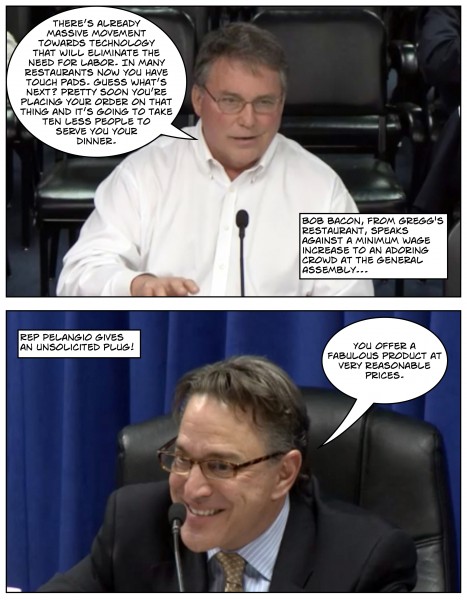
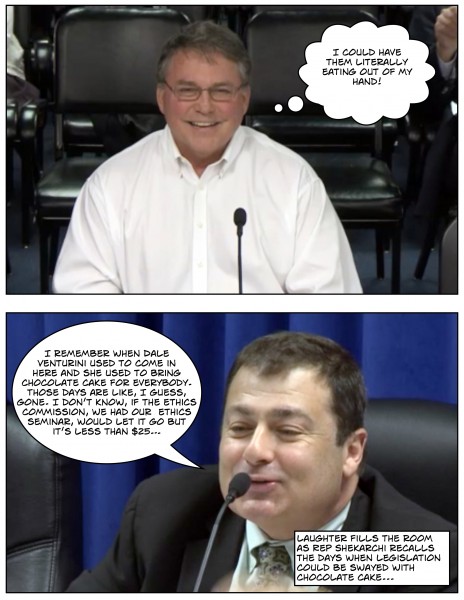

Right now, business owners and lobbyists have the reigns of the State House. They are pursuing an economic agenda that has only benefited those at the top and almost never those who struggle at the margins.
If low wage workers want fair treatment at the State House, they have to organize and demand it.
]]>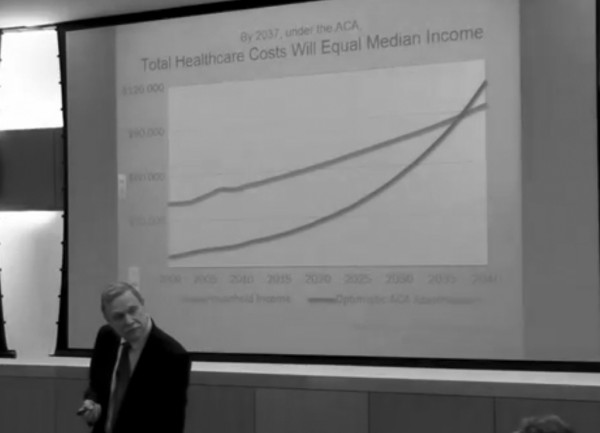
Dr. Oliver Fein, representing Physicians for a National Health Program (PNHP-RI), gave a talk Monday night to a class of second year med students at Brown University’s Warren Alpert Medical School in Providence. The talk was open to the public, but due to the snow storm attendance was low. That’s too bad, because Dr. Fein’s talk was an informative and eye opening examination of both the history of public healthcare in the United States and the possibility of transforming the current system beyond Obamacare and towards a system of truly universal coverage, what supporters call, “Medicare for All.”
In the video, Dr. Fein covers the history of healthcare in the United States, starting with President Truman’s suggestion that some sort of universal health care program might be a good idea, right up to President Obama’s successful passage of the Affordable Care Act. (For Dr. Fein’s summary, go here.)
At the 17 minute 30 second mark Fein leaves history behind and explicates the ideas behind a single payer healthcare model, or what he calls an “Improved Medicare for All.” Such a system would build upon and expand Medicare to the entire population, improve and expand coverage in the areas of preventive services, dental care and long term care, eliminate deductibles and co-payments, expand drug coverage (eliminating the “donut hole”) and redesign physician reimbursement.
Several points leapt out at me during Dr. Fein’s presentation. Using data from 2009, Fein reported that 62% of personal bankruptcies were due to medical expenses and 75% of those who declared bankruptcy had health insurance. For too many people, it seems, health insurance did nothing to prevent financial disaster.
Fein also reported that overhead costs in administering Medicare run about 3.1%. Commercial healthcare runs near 20%. This means that 17 cents (or more) of every health care dollar is wasted on administrative costs or corporate profits under our current system of private insurance. This is money that could be going towards patient care.
Fein concluded that a system based on private insurance programs will not lead to universal coverage and will not create affordable coverage, whereas a Medicare for All system can lead to universal comprehensive coverage without costing more money.
“What will happen if we don’t do this?” asked Fein in conclusion, “By [the year] 2038 a person’s entire household income will… have to pay for health insurance. A condition that’s not compatible with life.”
Rhode Island
Gerald Friedman, a PhD and Professor of Economics at the University of Massachusetts at Amherst released a 41 page report earlier this month on the possibility of adopting a single payer healthcare system here in Rhode Island. Friedman maintains that a single payer plan would result in significant savings for most Rhode Islanders and only increase healthcare spending for those making over $466,667 a year.
 Representative Aaron Regunberg, from the East Side’s District 4, is planning to introduce legislation for a statewide single payer healthcare plan this session. Model legislation from the PNHP is available here.
Representative Aaron Regunberg, from the East Side’s District 4, is planning to introduce legislation for a statewide single payer healthcare plan this session. Model legislation from the PNHP is available here.
More information about the Rhode Island branch of the PNHP can be found at their website.
]]> Following on the heels of a Government Accountability Office (GAO) report released last week, the U.S. Senate Special Committee on Aging held a hearing to put a Congressional spotlight on the alarming increase of older Americans becoming impoverished. The GAO policy analysts concluded that a growing number of the nation’s elderly, especially women and minorities, could fall into poverty due to lower incomes associated with declining marriage rates and the higher living expenses that individuals bear.
Following on the heels of a Government Accountability Office (GAO) report released last week, the U.S. Senate Special Committee on Aging held a hearing to put a Congressional spotlight on the alarming increase of older Americans becoming impoverished. The GAO policy analysts concluded that a growing number of the nation’s elderly, especially women and minorities, could fall into poverty due to lower incomes associated with declining marriage rates and the higher living expenses that individuals bear.
As many as 48 percent of older Americans live in or on the edge of poverty.
“While many gains have been made over the years to reduce poverty, too many seniors still can’t afford basic necessities such as food, shelter and medicines,” said Aging Committee Chairman Bill Nelson (D-FL).
Policy experts told Senate lawmakers on Wednesday that millions of seniors have been spared from abject poverty thanks to federal programs such as Social Security, Medicaid, Medicare, SSI, and food stamps. The testimony contrasted with the picture painted by House Budget Committee Chairman Paul Ryan (R-WI) earlier this week, who produced a report that labeled the federal government’s five-decade long war on poverty a failure.
Appearing before the U.S. Senate Special Committee on Aging, Patricia Neuman, a senior vice president at the Henry J. Kaiser Family Foundation, stressed the importance of federal anti-poverty programs.
“Between 1966 and 2011, the share of seniors living in poverty fell from more than 28 percent to about 9 percent, with the steepest drop occurring in the decade immediately following the start of the Medicare program,” said Neuman. “The introduction of Medicare, coupled with Social Security, played a key role in lifting seniors out of poverty.”
Neuman’s remarks were echoed by Joan Entmacher of the National Women’s Law Center, who credited food stamps, unemployment insurance and Meals on Wheels, along with Social Security, for dramatically reducing poverty among seniors.
The report was highly critical of many programs designed to help the poor and elderly saying they contribute to the “poverty trap.” Ryan and other House lawmakers have long proposed capping federal spending and turning Medicaid, food stamps and a host of other programs for the poor into state block grants.
Older Women and Pension Benefits
GAO’s Barbara Bovbjerg also brought her views to the Senate Select Committee on Aging hearing. Managing Director of Education, Workforce, and Income Security Issues, she testified that the trends in marriage, work, and pension benefits have impacted the retirement incomes of older Americans.
Over the last five decades the composition of the American household has changed dramatically, stated Bovbjerg, noting that the proportion of unmarried individuals has increased steadily as couples have chosen to marry at ever-later ages and as divorce rates have risen.
“This is important because Social Security is not only available to workers but also to spouses and survivors. The decline in marriage and the concomitant rise in single parenthood have been more pronounced among low-income, less educated individuals and some minorities,” she says.
As marriage and workforce patterns changed, so has the nation’s retirement system, adds Bovbjerg. Since 1990, employers have increasingly turned away from traditional defined benefit pensions to defined contribution plans, such as 401(k)s, she says, this ultimately shifting risk to individual employees and making it more likely they will receive lump sum benefits rather than annuities.
These trends have affected retirement incomes, especially for women and minorities, says Bovbjerg, that is fewer women today receive Social Security spousal and survivor benefits than in the past; most qualify for benefits on their own work history. While this shift may be positive, especially for those women with higher incomes, unmarried elderly women with low levels of lifetime earnings are expected to get less from Social Security than any other demographic group.
According to Bovbjerg, these trends have also affected household savings Married households are more likely to have retirement savings, but the majority of single-headed households have none. Obviously, single parents in particular tend to have fewer resources available to save for retirement during their working years. With Defined Contribution pension plans becoming the norm for most, and with significant numbers not having these benefits, older Americans may well have to rely increasingly on Social Security as their primary or perhaps only source of retirement income.
Inside the Ocean State
Although the GAO report findings acknowledge a gender-based wage gap that pushes older woman into poverty, Maureen Maigret, policy consultant for the Senior Agenda Coalition of Rhode Island and Coordinator of the Rhode Island Older Woman’s Policy Group, observes that this inequity has been around since the 1970s when she chaired a legislative commission studying pay equity. “Progress in closing the gender wage gap has stagnated since 2000 with the wage ratio hovering around 76.5 percent,” she said.
GAO’s recent findings on gender based differences in poverty rates are consistent with what Maigret found researching the issue for the Women’s Fund of Rhode Island in 2010. She found that some of the differences in the Ocean State can be attributed to the fact that older women are far less likely to be married than older men. Almost three times as many older women are widowed when compared to men.
Maigret says that her research revealed that older women in Rhode Island are also less likely to live in family households and almost twice as likely as older men to live alone. Of those older women living alone or with non family members an estimated one out of five was living in poverty. For Rhode Island older women in non-family households living alone, estimated median income in 2009 was 85% that of male non-family householders living alone ($18,375 vs. $21,540).
Finally, Maigret’s report findings indicate that aound 11.3 percent of older Rhode Island women were living below the federal poverty level as compared to 7.3 percent of older men in the state. Older women’s average Social Security benefit was almost 30 percent less than that of older men and their earnings were only 58 percent that of older men’s earnings.
There is no getting around peoples’ fears about outliving their savings becoming a reality if they live long enough,” said AARP Rhode Island State Director Kathleen Connell. “One thing that the latest statistics reveals [including the GAO report] is the critical role Social Security plays when it comes to the ability of many seniors to meet monthly expenses. Social Security keeps about 38 percent of Rhode Islanders age 65 and older out of poverty, according to a new study from the AARP Public Policy Institute.”
“Nationally, figures jump off the page,” Connell added. “Without Social Security benefits, 44.4 percent of elderly Americans would have incomes below the official poverty line; all else being equal; with Social Security benefits, only 9.1 percent do, she says, noting that these benefits lift 15.3 million elderly Americans — including 9.0 million women — above the poverty line.”
“Just over 50 percent of Rhode Islanders age 65 and older rely on Social Security for at least half of their family income—and nearly 24 percent rely on Social Security for 90 percent of their family income” states Connell.
“Seniors trying to meet the increasing cost of utilities, prescription drugs and groceries would be desperate without monthly Social Security benefits they worked hard for and planned on. As buying power decreases, protecting Social Security becomes more important than ever. Older people know this; younger people should be aware of it and become more active in saving for retirement. Members of Congress need to remain aware of this as well,” adds Connell.
Kate Brewster, Executive Director of Rhode Island’s The Economic Progress Institute, agrees with Maigret that older women in Rhode Island are already at greater risk of poverty and economic security than older men.
“This [GAO] report highlights several trends that make it increasingly important to improve women’s earnings today so that they are economically secure in retirement. Among the ‘policy to-do list’ is shrinking the wage gap, eliminating occupational segregation, and raising the minimum wage. State and federal proposals to increase the minimum wage to $10.10 would benefit more women than men, demonstrating the importance of this debate to women’s economic security today and tomorrow.”
House Speaker Gordon Fox is proud that the General Assembly in the last two legislation sessions voted to raise minimum wage to its current level of $8 per hour. That puts Rhode Island at the same level as neighboring Massachusetts, and we far surpass the federal minimum wage of $7.25, he said. He says he will carefully consider legislation that has been introduced to once again boost the minimum wage.
“Bridging this gap is not only the right thing to do to ensure that women are on the same financial footing as men, but it also makes economic sense”, says Rep. David N. Cicilline.
At the federal level, the Democratic Congressman has supported the ‘When Women Succeed, America Succeeds’ economic agenda that would address issues like the minimum wage, paycheck fairness, and access to quality and affordable child care. “Tackling these issues is a step toward helping women save and earn a secure retirement, but we also have to ensure individuals have a safety net so they can live with dignity in their retirement years,” says Cicilline.
With Republican Congressman Ryan in a GOP-controlled House, captured by the Tea Party, leading the charge to dismantle the federal government’s 50 year war on poverty, the casualties of this ideological skirmish if he succeeds will be America’s seniors. Cutting the safety net that these programs created will make economic insecurity in your older years a very common occurrence.
Herb Weiss, LRI ’12, is a Pawtucket writer who covers aging, health care and medical issues. He can be contacted at hweissri@aol.com.

Earlier this month, Bill Fischer, spokesman for the Rhode Island Democratic party, prophetically said in a statement to the press: “Paul Ryan may not be a household name to everyone in Rhode Island, but if you’re a senior citizen who relies on Medicare, you should know who he is and what he stands for, because these are the types of Republicans Brendan will be standing with and voting with, if elected to Congress.”
Well now that Paul Ryan is a household name, time will tell whom he proves to better benefit as a vice presidential candidate: Mitt Romney or President Obama. But his selection is certainly not going to help Brendan Doherty. The conservative-thinking, political newcomer is trying to parse himself as a moderate. But he’s has already suffered some from his close relationship with Ryan.
In May, Doherty told a Tea Party group in the East Bay that he supported Paul Ryan and his Medicare-cutting budget proposal. “I had a great opportunity to meet with Paul Ryan about a month ago and that’s his position and he’s digging his feet in and I applaud him for that and I support him,” Doherty said.
Later on the trail, Doherty said he wouldn’t vote to cut Medicare. But Paul Ryan donates to Doherty’s campaign and he *really wants to cut Medicare. “Furthermore, Mr. Doherty has gladly accepted $5,000 in campaign contributions from Mr. Ryan’s Prosperity PAC, further proof that Rhode Island’s seniors cannot trust Brendan Doherty to protect Medicare,” Fischer said in early August.
Perhaps this is why RIPR political reporter Ian Donnis said Doherty “walks a fine line in backing Romney’s pick of Paul Ryan.” (At least, I assume Ian writes his own headlines) in his statement on the selection.
Indeed, Doherty practically cops to the fact that Ryan is one of Washington’s most polarizing power players: “I do not believe that one political party is good and the other is bad. I do not believe that one party is for the middle class and the other is against it. I will focus on ideas that are formed through the cooperation of like-minded leaders from both parties, and those leaders then build consensus on both sides of the aisle.”
Great. If it’s true. But because Doherty is a political novice we have no idea what he will do if he ever gets elected to office. We know just since running for office he has changed what he thinks – or says – about Paul Ryan’s extremist budget proposal, among other issues.
]]> The last few years have been tough for our great Ocean State. Across Rhode Island, I’ve organized community dinners, main street tours, and coffee hours where I’ve heard firsthand from so many people struggling to find work, seniors worried about their Social Security and Medicare, families being crushed by unfair credit card rates, and students scared they are going to have to leave college because they can’t afford tuition. People are hurting and they are frustrated, but they aren’t giving up, and neither am I. I’ve listened and I’ve brought these stories with me to Washington, and it is my promise to you as your U.S. Senator that I will keep fighting to create jobs, protect essential benefits like Social Security and Medicare, and provide our kids with a brighter future.
The last few years have been tough for our great Ocean State. Across Rhode Island, I’ve organized community dinners, main street tours, and coffee hours where I’ve heard firsthand from so many people struggling to find work, seniors worried about their Social Security and Medicare, families being crushed by unfair credit card rates, and students scared they are going to have to leave college because they can’t afford tuition. People are hurting and they are frustrated, but they aren’t giving up, and neither am I. I’ve listened and I’ve brought these stories with me to Washington, and it is my promise to you as your U.S. Senator that I will keep fighting to create jobs, protect essential benefits like Social Security and Medicare, and provide our kids with a brighter future.OUR VOICE IN WASHINGTON
Rhode Islanders sent Sheldon to the Senate to fight for us and against the big special interests – and that’s just what he has done. We know that we can count on Sheldon to support our priorities – creating jobs, protecting families, and ending special deals for billionaires and big corporations. Sheldon has led the fight against moves to severely cut Social Security, Medicare benefits, and Pell Grants because he knows how much we in Rhode Island count on these programs. And he has opposed giving more tax breaks to billionaires and multinational corporations while middle class families continue to suffer.
SHELDON’S PLAN
Putting Rhode Islanders Back to Work. Sheldon has fought hard for legislation to create jobs, support small businesses, and revitalize our manufacturing sector.
- Sheldon introduced legislation that would meet President Obama’s call in his State of the Union speech to eliminate the tax loopholes that reward companies who ship US jobs overseas.
- Sheldon helped pass a Senate bill to crack down on China’s currency manipulation that costs American jobs by making it more expensive for us to sell goods to China, and cheaper for China to sell things here.
- Sheldon is supporting legislation that could fund significant transportation improvements, such as repairing the I-95 viaduct in Providence, and provide new construction jobs in Rhode Island.
- Sheldon has proposed a measure to provide tax credits to small businesses who hire unemployed workers to make it easier for a business to add new jobs.
Protecting Medicare and Social Security for Rhode Island Seniors. Sheldon will always be committed to preserving Social Security and Medicare benefits, and will continue fighting to reduce the cost of prescription drugs for seniors.
- When Republicans in the House passed dangerous legislation to end Medicare as we know it, Sheldon helped lead the fight against that bill in the Senate.
- Sheldon helped ensure that the health care reform bill closed the “doughnut hole” for prescription drugs covered under Medicare. More than 10,000 Rhode Island seniors benefited from this discount in 2011, saving $5.5 million dollars.
- When budget negotiators threatened to pass new cuts to Social Security to reduce the deficit, Sheldon stepped up to protect that vital program and helped form the Senate’s Defend Social Security Caucus.
Getting a Straight Deal for Middle Class Families. Sheldon has heard from so many Rhode Islanders who are frustrated with the special deals enjoyed by big corporations and billionaires. He shares that frustration and is working to restore the “straight deal” that middle class Americans expect and deserve – ending tax giveaways to Big Oil, combating unfair credit card interest rates, making sure millionaires and billionaires pay their fair share in taxes, and putting a stop to unlimited and anonymous spending by big corporations in our elections.
Supporting Education. Providing our children with a good education is the most important thing we can do to give them the opportunity to get the best jobs in the future.
- Sheldon is fighting to protect Pell Grants to make it easier for students to afford college. In 2009-2010, 19,937 Rhode Islanders received $69,567,944 in Pell Grants for an average of $3,489 per student.
- Sheldon has been working to extend the Elementary and Secondary Education Act to improve our nation’s middle schools by establishing a grant program to help fund reforms in struggling school systems.
Protecting our Environment and Coastal Economy. In Rhode Island, the strength of our economy is strongly tied to the health of our environment. Sheldon recognizes this, and is leading several bipartisan efforts to better protect our oceans and coasts – and the jobs they support. He’s working with Senator Snowe (R-ME) to establish a National Endowment for the Oceans, collaborating with Senator Vitter (R-LA) to re-authorize the National Estuary Program, and is co-chairing the Senate Oceans Caucus with Senator Murkowski (R-AK). Sheldon will continue fighting to advance these priorities in 2012.
Stay in Touch: whitehouse.senate.gov, facebook.com/SenatorWhitehouse, twitter.com/SenWhitehouse
]]> This is bound to be an exciting year for our state, and I know I speak for many when I say that the return of RI Future to the Ocean State’s blogosphere is a welcome one.
This is bound to be an exciting year for our state, and I know I speak for many when I say that the return of RI Future to the Ocean State’s blogosphere is a welcome one.
From Netroots Nation coming to Providence – something Mayor Taveras and I worked particularly hard to ensure – to our continued efforts to get Rhode Island’s economy moving again and put people back to work, there will be no shortage of Rhode Island events for us to discuss here on RI Future.
But as we look forward to the year ahead, we have to take a hard look at where we are now. When one month of unemployment, one missed mortgage payment, or a single medical bill can push a Rhode Island family over the brink, we know it’s more important than ever to re-commit ourselves to protecting the programs that formed the foundation of our nation’s middle class: Social Security, Medicare, and Pell Grants.
These three programs are the pillars of American prosperity and economic security. Unfortunately, last year alone, Congressional Republicans attempted to undercut each of these programs. The House Republican Budget would have slashed Pell Grants for more than 1.3 million students and ended Medicare as we know it. And legislation has been introduced in the House to allow private accounts to replace Social Security.
This is wrong, outrageous, and as long as I’m in the Senate, you can count on me to fight against attacks like these on the pillars that sustain the middle class.
That’s why I stood with Senator Sanders from Vermont to advocate for legislation to keep Social Security solvent for the next 75 years.
That’s why I called on President Obama to make sure he keeps Medicare benefits off the chopping block in deficit negotiations.
That’s why I’ve cosponsored legislation to allow Medicare to negotiate drug prices to lower costs, without reducing the benefits.
And that’s why I’ve been reaching out to the students who depend on Pell Grants and bringing their stories to Washington.
I’m glad to say that we beat back the House attempts to slash Pell grants and Medicare benefits in the Senate, but we need to stay active to defend our progressive principles. Please take a moment to sign the petition to defend Social Security and Medicare benefits or share your Pell Grant story with me.
The more voices we have the stronger we will be.
*****
Sheldon Whitehouse is the junior U.S. Senator from Rhode Island. To keep up with Sheldon online, please visit him on Facebook and Twitter.
]]>